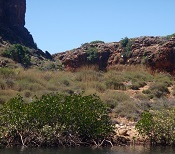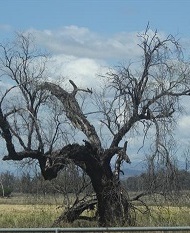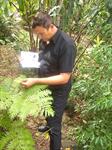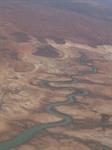Start your Career in Environmental Protection here
Explore conservation issues and strengthen your knowledge of the environment.
Learn to manage conservation in different environments.
Gain theoretical knowledge and practical skills in contemporary environmental and conservation management practices.
For people working in conservation or environmental fields, aspiring to work in these fields, or anyone with a passion for sustainability.
COURSE STRUCTURE AND CONTENT
There are eight lessons in this course:
 1. An Introduction To Ecology
1. An Introduction To Ecology
- Spaceship Earth
- Conservation; Use of Resources, ecological value, economic value, genetic diversity
- Overkill
- Urbanisation
- Basic Ecology
- The Ecosystem
- Constituents for the Ecosystem
- Ecological Concepts
- The Web of Life; climate, producers, consumers, decomposers The Food Web
- Habitat and Niche
- Humans in the Environment
- Energy Flow
- Imbalances
- The Greenhouse Effect and Global Warming
- Climate Change
- El Nino
- International Efforts to Counter Climate Change; IPCC, UNFCC, Kyoto Protocol, Copenhagen Summit, Worldwatch Institute, etc.
- Terminology
2. A Perspective On Environmental Problems
- History of Conservation
- Natural Resources; Renewable, Non Renewable
- Goals of Conservation
- History from Industrial Revolution to WWII
- WW2 and Post War Period
- International Conservation
- Deforestation
- Loss of Agricultural Land
- Loss of Biodiversity Endangered Water Supplies
- Exhaustion of Non Renewable Resources
- Political and Economic Issues of Conservation
- Environmental Damage in Free Economies
- Pollution in Planned Economies Supply of Resources
- Limits to Growth
3. Pollution and Industry Effects On The Environment
- Nature and Scope of Pollution
- Industrial Pollution
- Types of Pollutants
- Effects of Pollution
- Nuclear Pollution
- Sick Building Syndrome
- Asbestos Fibre
- Urbanisation
- Energy Alternatives
- Deforestation
- Nuclear Energy, Hydro Power, Solar Energy, Wind, Waste Power
4. Water and Soil
- Introduction
- Dams
- River Catchments
- Wetlands
- Water Pollution
- Recycling
- Desalination
- Water Environments
- The Hydrological Cycle; Infiltration, Rainfall, Evaporation, Effective Rainfall, etc
- Water and Plant Growth
- Keeping Water Clean
- Sewerage Treatment
- Soil; pH, texture, structure
- Land and Soil Degradation;
- Loss of soil fertility
- Erosion
- Salinity
- Soil compaction
- Soil acidification
- Build up of dangerous chemicals
 5. Vegetation Conservation and Management
5. Vegetation Conservation and Management
- Value of Trees
- Commercial Value of Trees
- Rainforests
- Forest Systems and Biomass
- Forest Conservation
- Trees and the Environment
- Environmental consequences of Deforestation
- Afforestation
- Classification of Forests
- Desertification
- Acid Rain
- Environmental Weeds
- Strategies for Preservation of Native Grasslands
6. Animal Conservation and Management
- The Human Animal
- Urbanisation
- Wildlife
- Threatened Species
- Invasive Species
- Wildlife Management; approaches, preservation, conservation, goals
- Wildlife Habitats
- Water Management for Wildlife
- Wildlife Surveys
7. Marine Conservation and Management
- Estuaries
- Fisheries; stock management, assessment, biomass, stock management methods
- Conservation of Sandy Shores
8. The Future
- Tourism and the Environment
- Ecotourism
- Ecologically Sustainable Development (ESD)
- Framework for ESD
Each lesson culminates in an assignment which is submitted to the school, marked by the school's tutors and returned to you with any relevant suggestions, comments, and if necessary, extra reading.
What you will do in this Course
Here are some examples of what you may do:
- Describe ecological processes and associated sustainable management techniques.
- Investigate a specific environmental problem and provide possible solutions.
- Evaluate the relationship between industry and pollution.
- Discuss principles of water and soil management.
- Select a specific type of plant that is endangered or an environmental problem and submit a case study.
- Explain animal conservation strategies, including protection legislation, breeding programs and habitat conservation.
- Discuss a specific issue that applies to marine conservation.
- Develop profiles of three different conservation and/or environment lobby group organisations and procedures used in promoting their cause.
 Ecological Concepts
Ecological Concepts
Knowing the basic components of an ecosystem leads to learning of the basic ecological concepts. Different authors might list concepts in different ways, however, the following are basic, universally accepted and essential to any ecosystem:
The sun is the source of all energy.
All energy in any organisms originally came from the sun. Other energies in the environment also originated from the sun (e.g., wind, tides, water cycle, light, etc.). The sun warms the earth, and provides energy for photosynthesis in plants. The synthesis of carbon compounds through photosynthesis converts sunlight energy into chemical energy that directly, or indirectly, provides food for almost all other organisms.
Everything is connected to everything else.
All living things interact with other things (both living and not living) in their environment. The climate affects the living things in an area. The plants influence the insect population and the insects eat the fish, and on it goes.
Everything must fit how and where it lives.
'Adaption' is the key word of this concept! (i.e., Unless a species adapts to a situation, it will not survive). A principle related to this concept is the 'Dam Law'. The Dam Law states.... 'die, adapt or move'.
Everything is going somewhere and becoming something else.
We can never really throw it away. An ecosystem is dynamic; in a constant state of change. In death there is no waste matter. It is continually recycled among biotic or abiotic components. Rocks are worn down into soil, soil is used by plants, changed, moved and leached by the forces of the environment etc.
 All action has a consequence.
All action has a consequence.
For every action there is a reaction. For every event there is a consequence. There is a delicate balance of nature between producers and consumers which allows both to exist. If this interrelationship becomes and remains unbalanced, one and/or both members of the interrelationship will die.
Why Study with ACS?
Design your own learning pathway.
Study at your own pace, from anywhere, at any time.
Receive prompt, expert support from our team of committed and friendly tutors.
Your learning is our priority. We are flexible and adaptable to meet your educational needs!
Enrolling is easy - just go to the top of this page and select your study method and payment option.
If you have any questions about studying with ACS, or want to know more about any of our courses, get in touch with our specialist tutors today. They will be happy to answer your questions and look at different study options to fit in with your goals.